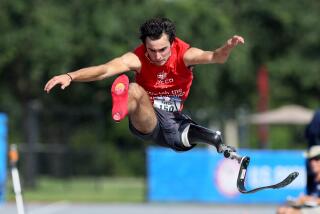An Overlooked Star
- Share via
Have you heard NBC’s wildly enthusiastic Olympic promos touting the prowess of Tom Pappas, the U.S. decathlete of Greek ancestry, and the perfect story line for the Athens Games?
Folks at Azusa Pacific have, and they wrinkle their noses and ask, “Hey, what about Bryan Clay?”
Pappas, the two-time defending world champion, was supposed to be headed for an Olympic showdown with the Czech Republic’s world-record holder, Roman Sebrle, and then maybe Bruce Jenner-like fame.
But a funny thing happened to Pappas on his way to coronation as the unofficial “world’s greatest athlete.” Clay -- who at 5 feet 11 and 174 pounds is six inches shorter and almost 40 pounds lighter than Pappas -- set three individual records in the final four events at last month’s Olympic trials, snatching the top spot on the podium.
Then another funny thing happened, according to Martin Hee, Clay’s former coach at Castle High in Kaneohe, Hawaii, who was at the awards ceremony in Sacramento.
“Bryan was in the middle and Tom Pappas and the third-place guy [Paul Terek] were on either side,” Hee told the Honolulu Star-Bulletin. “Bryan was elevated, so they were all the same height.”
It’s not as if Clay, 24, came out of nowhere, but when it comes to flying under the radar, this guy is a British Mosquito clipping waves on the English Channel in 1943 while ferrying agents into France.
Track & Field News, the self-proclaimed “Bible of the sport since 1948,” took virtually no notice of Clay’s career at NAIA Azusa Pacific, where his decathlon scores would have made him the NCAA Division I champion for an unprecedented three consecutive years.
Clay’s accomplishments have been well-kept secrets, but he claims to be mostly unperturbed about all this disrespect ... well, maybe he thinks he deserves a little more love.
“It keeps me humble, it keeps me hungry, it keeps me wanting more and reminds where I’ve come from,” he said. “If I was doing a bunch of commercials and stuff, and I was seeing myself on TV all the time, it would change the expectations and create a lot more pressure.
“This way, it’s easier to maintain my focus on the things that have gotten me this far. I really think it’s a good thing. As much as I don’t like it and it gets under my skin sometimes, it has definitely fueled my fire the last few years.”
Pappas, the great-grandson of a Greek immigrant, may have millions rooting for him in Greece, but Clay is likely to develop a large, and diverse, following of his own during the Games, given his undersized underdog status and his journey to this place in time.
His mother is of Japanese ancestry; his father is African American. He was born in Texas, grew up in Hawaii and trains in Azusa. He became the first athlete from Hawaii to make the U.S. Olympic track and field team since steeplechaser Henry Marsh in 1988 and could be the first to win a medal.
“I grew up in Hawaii from the age of 5,” said Clay, who draped himself in a Hawaiian flag after his victory at the trials. “That’s where my mom’s family lives, that’s the place of all my childhood memories, that’s where my biggest support system is.
“It’s home for me, it’s who I am. Being Hawaiian is a lifestyle, not a bloodline.”
Clay says the islands are “a very special place, anyone who has ever been there knows that,” but his life in Hawaii was far from idyllic. He was a self-described “angry child” before his parents were divorced and an even angrier adolescent after the split.
“I got kicked out of kindergarten in Hawaii because I couldn’t play with other kids,” he said. “I was very competitive, even then, and I knew the rules to most sports when most of the kids my age didn’t. So when a kid would run up, push me and take the ball away from me in basketball, I knew it was a foul and it would infuriate me.
“There would be fights and, for some reason, my trademark was that I would bite them on the cheek. I just didn’t know how to express my anger and, predictably, I would do a lot of stupid stuff for negative attention.”
His tendency to turn into Mike Tyson on opponents nipped in the bud his careers in soccer, baseball and basketball. His mother mandated that he compete only in individual sports, and soon track and field became his passion.
Clay was “discovered” by 2000 Olympic decathlon bronze medalist Chris Huffins, now the track coach at California, during a summer clinic in Hawaii before Clay’s junior year in high school. Clay, then a sprinter, was looking to expand his horizons and Huffins, who said he noticed that Clay did things very naturally, suggested seminars on hurdling and throwing events.
Later, he challenged Clay to a shotput contest. Given about “a five-meter handicap,” Clay won and Huffins gave him a pair of his shoes.
They kept in touch and the summer before his senior year, Huffins told Clay -- a state champion sprinter and hurdler who was then dabbling in the throws and pole vault -- he had the perfect college for him.
“He told me, ‘Don’t ask, because you’ve never heard of it,’ ” Clay said.
Clay asked anyway ... and Huffins was right.
But Clay, who always figured he would end up at a big-time Division I school, knew a visit to a small Christian college would please his mother, so he agreed to check out Azusa Pacific. And he never went anywhere else.
“My goal, of course, was to sign him before he went home,” said Azusa Pacific Coach Kevin Reid, who coached Olympic decathlete Dave Johnson and has led the Cougars to five NAIA championships between 1996 and 2003. “I knew Chris had a strong influence on Clay and I was certainly glad to get him.
“In terms of potential, his upside was unlimited ... and it still is.”
Even Reid figured the world would have to wait until the 2008 Games to see Clay reach his zenith. The feeling was that a spot on the Olympic team this year -- Clay, Pappas and Terek all made the team -- would be nice, but certainly not an essential step toward that goal.
In the last few months, however, Clay started putting up startling numbers and even Sebrle took notice. After Clay finished second, only 75 points behind him in the seven-event heptathlon at the world indoor championships in March, Sebrle told reporters, “He is not so high [tall], but he is very powerful. I think I must pay attention to him for the Olympics.”
So, maybe there were a few people who weren’t stunned when Clay bested Pappas at the trials.
“I thought Bryan would win by 200 points more than he did,” said David Pope, who trains with Clay. “He went down to the training center [in Chula Vista] and did all the field events, everything but the running, a couple of months ago and if you took the events he did there and the running he did [at the trials], he would have scored right around 9,000 points.”
Sebrle’s world record is 9,026.
“It’s funny because I always dreamed about competing in the Olympics,” Clay said. “It was always about making the team, though, not necessarily winning a medal. It’s more about how you fight, how you carry yourself, how you represent your country.
“I never expected this to happen this year, so for me, it’s all about the experience of going there and competing to the best of my ability.”
More to Read
Go beyond the scoreboard
Get the latest on L.A.'s teams in the daily Sports Report newsletter.
You may occasionally receive promotional content from the Los Angeles Times.






